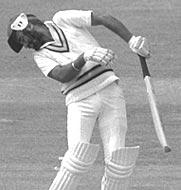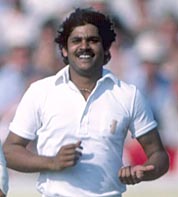 | « Back to article | Print this article |
When Kapil Dev's team conquered two-time champions the West Indies on June 25, 1983, a new chapter was written in India's cricket history.
As 66-1 outsiders, India's chances of making it to the winner's podium were as bleak as Kenya winning the 2003 World Cup.
What happened on that 'Super Saturday' ranks among the most incredible accomplishments in team sport.
Faisal Shariff spoke to famous historian Ramchandra Guha about the triumph and what it meant to Indian cricket.
Where would you place India's 1983 World Cup triumph?
There are only two contestants for the greatest title ever for India: one is the 1971 series victory in England and the other is the 1983 World Cup win. The 1971 victory was achieved in Test cricket, which is the traditional form of cricket. The 1983 victory is significant because we were no-hopers, we weren't regarded as having a chance to even reach the semi-finals and because the winning side was much more representative.
In the past, the best Indian teams were heavily dominated by players from Mumbai. The side which won the 1971 series had seven players from Mumbai. The 1983 team was much more Indian and much more representative; it had players from the South, Punjab and three players from Mumbai too. In that sense, it was genuinely a more representative Indian side.
It was the democratization of the Indian team; the coming in of quality players from all parts of India and not just a few exclusive centers.
People from different parts of India could identify with the side. There was a Sikh, a Muslim, a Christian; there were some Hindus and others. There was a Kannada, a Tamilian, and Maharashtrians. In that sense, it was a complete side because different parts of India could identify with the team, whereas if you have a Mumbai dominated side it is difficult for a north Indian guy to adjust.
What else do you think did the 1983 win do to Indian cricket?
I think it made one-day cricket great. Till 1983, one-day cricket was insignificant. Test cricket was the big thing. If you look at the early 1980s, when teams played in India, there was very little crowd for one-day cricket matches and we were temperamentally oriented towards thinking that Test matches was really true cricket. We were never expected to do well in one-day cricket, our batsman were not supposed to be aggressive enough, fielding was not supposed to be good enough, we didn't have enough fast bowlers. Indians had a psychological block against one-day cricket in terms of playing because we never did well at it and also the spectators believed that the best cricket was the five-day game.
This was a completely unexpected victory. When we reached the semi-finals there was a wonderful moment when we were winning against England. Kapil Dev came in to bat with ten runs for victory. He was standing at the non-striker's end with a really broad smile on his face, because he was so kicked that his side would reach the final, whether or not win it.
This triumph was an eye opener that one-day cricket is exciting. The significance really was that it was the beginning of the end of the dominance of Test cricket and identification of Indian fans with one-day cricket.
Where were you when India won the final on June 25? Can you recount the experience of following the World Cup?
I was in a room in Calcutta. I was then doing a PhD at that time with the Indian Institute of management and I was crowded around the television set with 100 other students. We watched India bat, make its way to 183 and we thought we had little chance.
 When the West Indies came in to bat, and Haynes got out early, we thought thoda chance hai [slight chance of winning].
When the West Indies came in to bat, and Haynes got out early, we thought thoda chance hai [slight chance of winning].
Later, Viv Richards started hammering and some students disappeared. At a crucial stage, the television went on the blink and I had a radio so I put it on and that is how I came to know that Richards had got out.
Actually, if you remember Richards got out to a catch by Kapil at mid-wicket. Doordarshan had lost the signal from England at that time. Not a single Indian -- though they might bluff about it right now -- saw the moment that swung the match live. It was Kapil's great catch, which he took running backwards for about 20 yards to dismiss Richards.
Then Clive Lloyd got out and later the signal came back and we saw the match. I was in a crowded college room with lots of other people. Only the semi-final and final were telecast live.
According to you, what was your unforgettable moment of that entire World Cup?
 Well, I suppose there were many moments from the semi-final. I would pick two moments: one was Kirti Azad bowling Ian Botham with a ball that rolled around the ground; the other was Yashpal Sharma hitting Bob Willis for six.
Well, I suppose there were many moments from the semi-final. I would pick two moments: one was Kirti Azad bowling Ian Botham with a ball that rolled around the ground; the other was Yashpal Sharma hitting Bob Willis for six.
This was similar because Kirti Azad was obscure; Ian Botham was famous. Yashpal Sharma was obscure and Bob Willis was famous. In each case, it was an obscure Indian. I mean it wasn't Sunil Gavaskar or Kapil Dev; it was Yashpal Sharma and Kirti Azad, who humbled the Englishmen.
From the final, I would pick Kapil Dev's catch, and Gordon Greenidge being bowled by Balwinder Sandhu. That was something that opened the crack in the West Indies innings.
There has been a lot of talk that India should stop celebrating that win which happened 20 years ago and move on. Do you also subscribe to that school of thought?
I don't think it's 'either-or' choice. We can remember it for what it was, but we need to remember it in proportion. Think of the present and the future team. Think of ways in which we can build a better team; ways in which we can overcome the weaknesses of Indian cricket.
One of the weaknesses of Indian cricket is parochialism. Now there are allegations that the 'A' side, which is now touring England, has a zonal quota. The 1983 team was a representative side. Maybe, we should have three selectors rather than having five zonal selectors. Nostalgia is good but it has to be in small doses.
If you were to compare the 1983 World Cup final to the 2003 final in which India played, are there any striking similarities that you come across?
In both cases, India was the underdog. In 1983, the West Indies had not been defeated in the last two editions of the tournament. They won in 1975, 1979, and in 1983 they lost to us. But, basically, they were the top side; they were not expected to lose. Even Australia was not expected to lose.
We were the underdogs. In one case we pulled it off and in other we didn't.